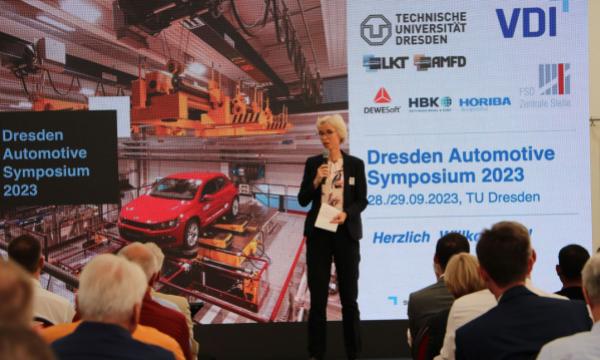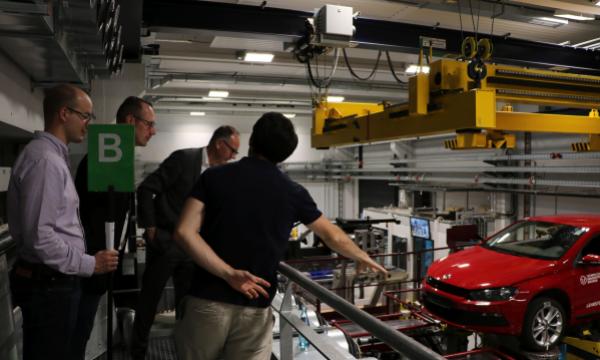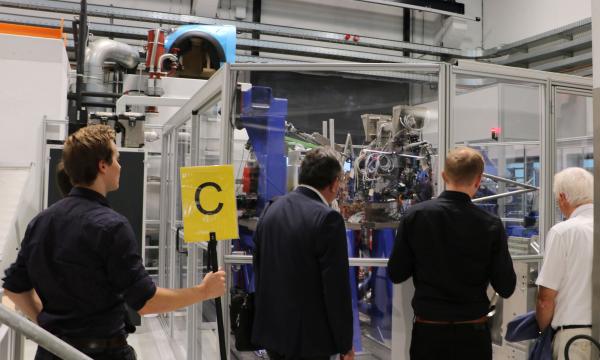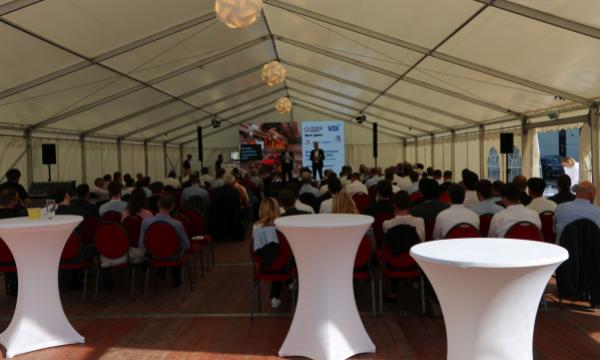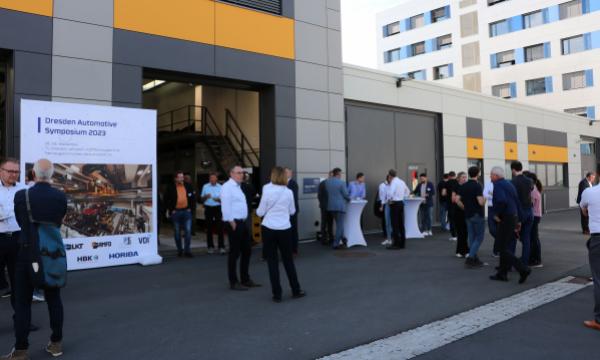
You are here
Networking science and practice
Current developments in automotive engineering - these were the topics at the Vehicle Test Centre of TU Dresden in the end of September.
The invitation was extended by the Chair of Automobile Engineering headed by Prof. Günther Prokop and the Association of German Engineers (VDI).
Research into automotive technology has been conducted in Dresden for 120 years. Then as now, the location and automotive research at the TU Dresden (TUD) stand for innovation, pioneering research and advanced laboratory facilities. An excellence that is worth being presented to external partners. Therefore, the Chair of Automobile Engineering at TU Dresden and the Association of German Engineers (VDI) jointly invited to the 1st Dresden Automotive Symposium on September 28 and 29, 2023. 150 participants from industry, research and politics accepted the invitation.
The conference took place in the new Vehicle Test Centre of TU Dresden. The test center for research into safe and automated mobility of the future had officially been handed over to the Rector of TU Dresden, Prof. Dr. Ursula M. Staudinger, by the Saxon Minister of Finance Hartmut Vorjohann in January 2023. Now, at the end of September, the FVZ focused on current topics in automotive research such as passive and active safety in automated driving, the development of electrified high-performance drives, the latest trends in braking systems, and research trends in human-machine interaction and the driving experience.
The symposium was opened by Prof. Dr.-Ing. Günther Prokop, Head of the Chair of Automobile Engineering at TU Dresden, together with Dipl.-Ing. Uwe Bastian, Deputy Chairman of the VDI Dresden District Association and Chairman of the Vehicle and Traffic Engineering Working Group. Afterwards, the Dean of the "Friedrich List Faculty of Transport and Traffic Sciences at TUD, Prof. Dr.-Ing. Regine Gerike, placed the automobile in the mobility landscape of the future in her welcoming address to the participants: "Automotive Technology at the TU Dresden is part of the Faculty of Transport and Traffic Sciences - and not, as is often the case, assigned to Mechanical Engineering. For us, it is part of a systemic overall view of mobility. For us, automotive technology is not driven first and foremost by technology, but by social requirements. As a result, the automobile remains sustainable. It is part of the solution, not the problem," says the dean.
Impressions of the 1st Dresden Automotive Symposium at TU Dresden
Impressions of the 1st Dresden Automotive Symposium at TU Dresden
Impressions of the 1st Dresden Automotive Symposium at TU Dresden
Impressions of the 1st Dresden Automotive Symposium at TU Dresden
Current and future aspects of automotive research at TU Dresden
Current and future aspects of automotive research were also the subject of the varied program of presentations - with lively discussions afterwards.
Prof. Günther Prokop himself was the closing speaker. He looked back on "120 years of automotive technology at the TU Dresden" and asked: "Where do we come from, where are we going?" His journey through time began in 1903 with the founding of the Königlich-Sächsische Technische Versuchsanstalt at the Technische Hochschule zu Dresden by Professor Hermann Scheit. Today, automotive research at the TU Dresden focuses on the potential area of "Automated and Networked Mobility" in conjunction with the Vehicle Test Centre, the Highly Immersive Driving Simulator and the Smart Mobility Lab, which is currently being planned as the TUD's new research campus in Hoyerswerda/Lusatia.
The first day of the Dresden Automotive Symposium was rounded off by guided tours of the Vehicle Test Centre with its 14 test benches, four measurement laboratories and workshops covering 1,500 square meters.
Day 2: Presentation of the "High-immersion driving simulator" project at TU Dresden
On the second day, the participants went outside the gates of the city of Dresden to a test hall. There they were introduced to the highly immersive driving simulator currently under development. The simulator is the only one of its kind in the world and will be used for scenario-based testing of automated driving functions and for optimal human-machine interaction. Currently, the extensive technical fine-tuning of the prototype and its individual components is in progress. Prof. Prokop and his team demonstrated dynamic maneuvers of the motion platform to the guests to show its very good dynamic properties. The experts from automotive development were impressed by the innovation project and the developments to date.
Günther Prokop's conclusion after the symposium was thoroughly positive: "The Dresden Automotive Symposium 2023 gave a comprehensive and deep insight into the current developments in automotive technology. With its state-of-the-art test facilities and a know-how that has grown over 120 years, the TU Dresden has a lot to contribute to this." Thus, he said, it is already certain that "a continuation of the symposium in 2024 is being planned."
Awards
With Prof. Dr.-Ing. Rodolfo Schöneburg and Karl-Heinz Baumann (both former Mercedes-Benz), two people were also honored at the first Dresden Automotive Symposium who have rendered outstanding services to the training of young automotive engineers at the Dresden location. Between 2007 and 2020, the two taught integral safety to more than 1,000 students at TU Dresden and HTW Dresden. They also supervised around 100 final theses and internships at Mercedes-Benz and were involved in the joint research association "Tech-Center i-protect" for research into new concepts for integral safety.
Prof. Dr.-Ing. habil. Horst Brunner was honoured for his many years of service to automotive engineering and the development of TU Dresden. In particular, his commitment and far-sighted actions in the years following German reunification, the establishment of traffic accident research at TU Dresden and his ongoing commitment to automotive engineering in Dresden were honoured. Günther Prokop: "If automotive engineering at TU Dresden is prospering today, it is also thanks to Horst Brunner."
Originalautor
Lecture programme Automotive Forum
Integral Vehicle Safety - History, Strategy and Innovations. A review of 14 years of lectures at the Chair of Automobile Engineering in Dresden - presented by Prof. Dr.-Ing. Rodolfo Schöneburg and Karl-Heinz Baumann (both former Mercedes Benz AG).
Contribution of the modern electronic main inspection for a safe and sustainable mobility - a lifetime of the vehicle. Dr.-Ing. Philipp Schuricht (FSD Fahrzeugsystemdaten GmbH) covered the changing demands on roadworthiness testing from new types of driver assistance and automated driving functions.
Highly automated driving in sight? The road to commercial use of the technology. Felix Breitstadt of ridesharing provider MOIA, described new mobility concepts in Mobility as a Service (MaaS) offerings, including advances in the organization of MaaS services and the influence of driving automation on them.
Industry trends influencing future truck chassis solutions. Urs Gunzert (MAN Truck & Bus SE) presented concepts for the electrification of trucks in long-distance transport.
Powertrain development in China. Dr.-Ing. Pavel Kvasnicka (BMW Group) spoke about the development and homologation of powertrains in China.
Development Process of a Formula 1 Powerunit. Dipl.-Ing. Axel Wolf Wendorff from IngenieurbüroWendorff.works ltd provided insights into his many years of experience as head of powertrain development in the Formula 1 series.
Potential area "Automated and networked mobility" at TU Dresden
The potential area focuses on the design of efficient, safe and intelligent transportation systems. Transportation and mobility are rethought under the normative vision of sustainable development. Research on new automated and connected technologies is driven by and simultaneously inspires research on user needs and mobility services. Five focus areas have been defined for this integrative research claim.
Contact
Prof. Dr.-Ing. Günther Prokop
Head of the Chair of Automobile Engineering
"Friedrich List" Faculty of Transport and Traffic Sciences at TU Dresden
Mail: guenther.prokop@tu-dresden.de
At our faculty, automotive technology is not driven first and foremost by technology, but by social requirements. This keeps the automobile fit for the future. It is part of the solution, not the problem.

